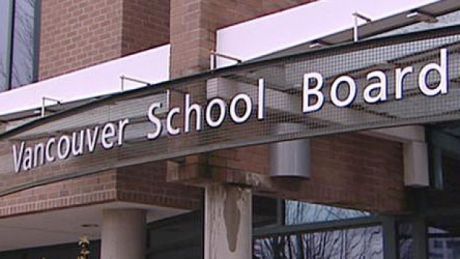Shared
You are here
Vancouver elementary teachers rally against school board austerity

July 12, 2015
On Monday, June 29 after school had let out for the summer, most Vancouver teachers were taking a well-deserved break. However, a small but determined group of teachers and other trade unionists gathered outside the Vancouver School Board (VSB) office as the Vancouver School Trustees met to vote on the budget for the next school year.
The flash demonstration was called by the Vancouver Elementary School Teachers’ Association (VESTA) to show support for Vancouver’s elected school trustees. Teachers were concerned that the recent passage of Bill 11 and the appointment of a ‘special advisor’ to oversee the VSB’s budget process meant that the Liberal government was moving towards eliminating school boards’ ability to decide their own budgets.
Unfortunately, as bad as it is, Bill 11 is just another new attempt to force cuts on locally controlled school boards, which have already been compelled to pass austerity budgets in this and past years. This has happened because the Liberals have prohibited school boards from running deficits, but at the same time they have starved boards for funds, so trustees of all political stripes have said that they have no choice but to make cuts.
Vancouver’s budget for 2015 is no exception; it includes cuts to the adult education program, reducing services and closing education centres on Vancouver’s less affluent East Side, and cuts to music programs in elementary schools across Vancouver.
These cuts to upgrading programs affect some of the city’s most vulnerable, such as those who live in Vancouver’s Downtown East Side, and come after more than a decade of cuts to public education in BC. (The trustees mentioned in a submission to the Liberal government that the district would need $59.5 million in additional money just to be able to provide the same level of service that was delivered before the 2002-2003 budget cuts.)
So what is the solution to the cuts and austerity budgets that have become the norm? Some activists have argued that the answer is to focus on elections; if we elect progressive trustees (i.e. Vision or COPE in Vancouver) they will surely find a way to stem the hemorrhaging.
But this electoral approach is unlikely to be effective; trustees can’t be expected to hold the line on cuts all by themselves. Pressure from the government to comply can be intense; trustees still remember how the Cowichan board was dissolved in 2012 for daring to submit a needs budget.
But a grassroots movement of parents and teachers can counter this pressure. We saw a small example of this in 2010 when public outcry saved Sir Guy Carlton Elementary from slated closure. The Chicago Teachers’ Union has demonstrated how this can be done on a larger scale, with their ongoing solidarity work building alliances with the community in mostly poor Chicago neighbourhoods.
Teachers and community activists like those at Monday’s rally have also put their hopes in a future provincial NDP government to restore funding, but this too has its problems. When asked if they would reverse the Liberal tax cuts that have emptied provincial coffers of the money needed to fund social programs, the NDP have hemmed and hawed – voters don’t like tax increases! But a grassroots movement could push the NDP to make them see that fully funding public education is a key issue, much in the same way that the mobilization against Bill C-51 made the Federal NDP take a stand against that unpopular bill.
Sadly, the group of demonstrators who rallied outside the school board office weren’t able to halt this round of cuts – one rally can’t do that. However, if we follow the example of our Chicago counterparts, teacher activists and parents can build an effective grassroots movement that can really have an impact in the fight to protect public education. Events have shown that we can’t just vote for someone whom we hope will protect our public schools – we have to do it ourselves.
This is shared from rankandfile.ca
Section:









